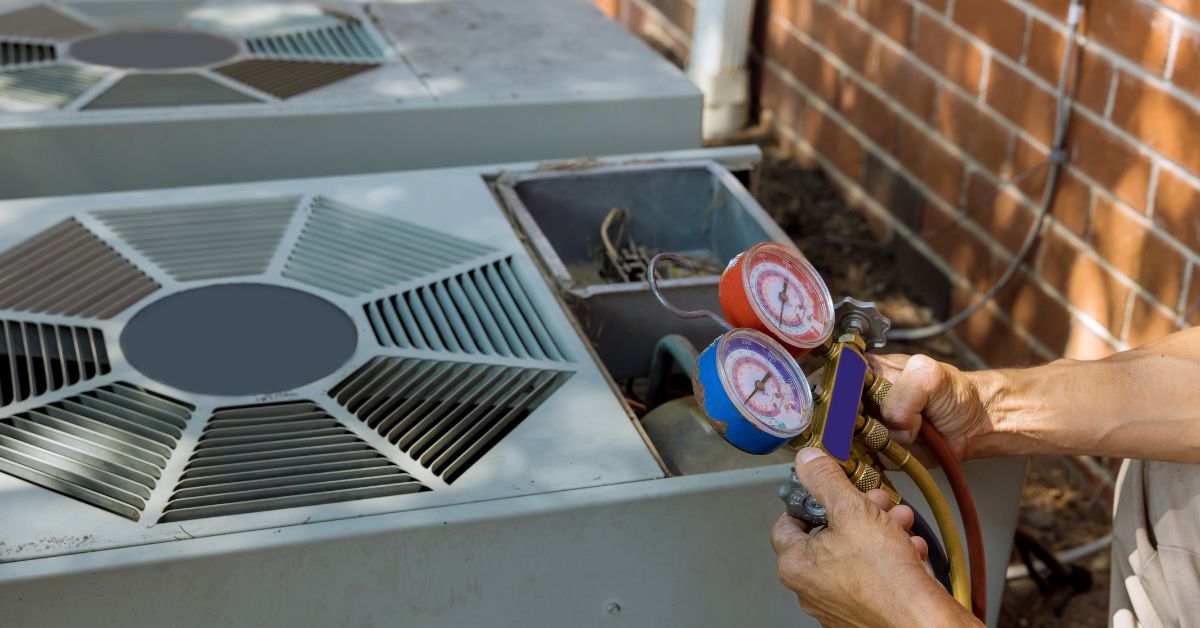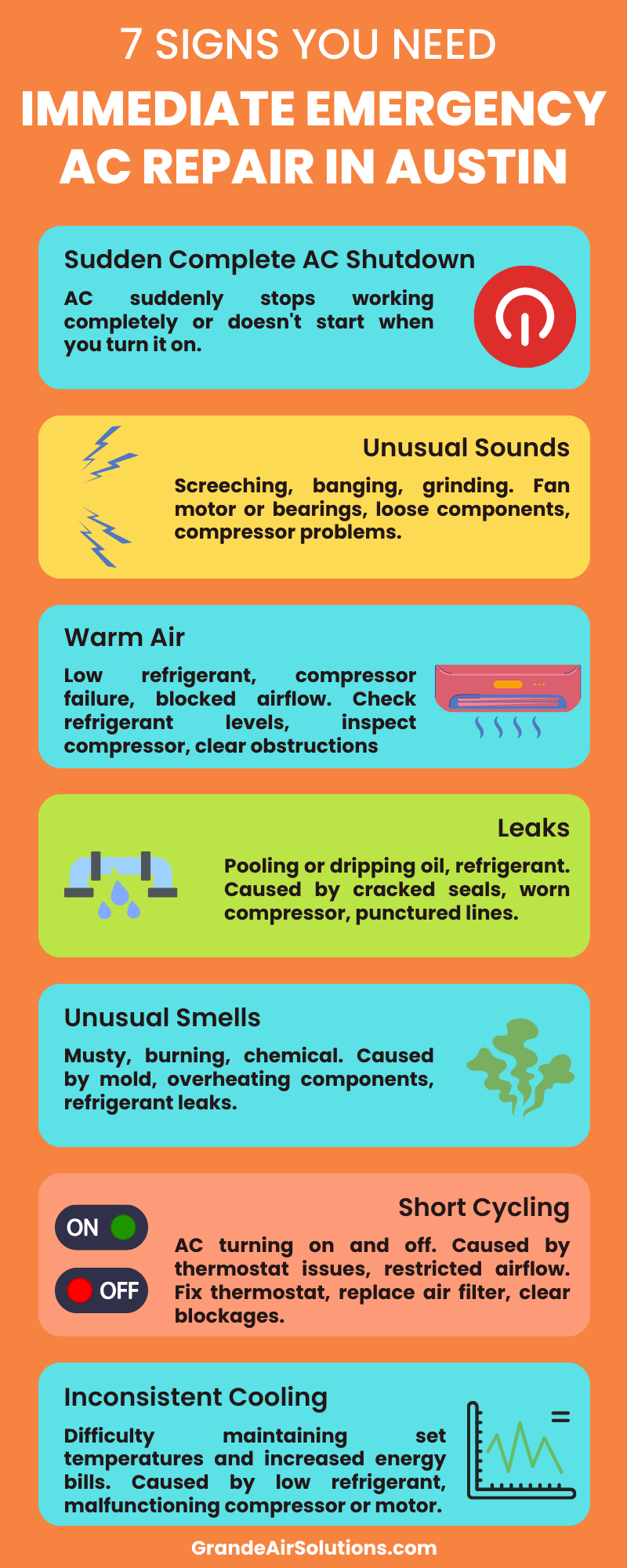
Texas is the second most in-demand state for HVAC services with over 31,000 HVAC technicians required. This shows how much Texans love their air conditioners and why we might need more emergency AC repair in Austin than other states. It's too hot here, making air conditioner emergencies a common occurrence.
But since emergency AC repair comes with a higher price tag, it's important you know when to get this service as opposed to regular one so you don't end up spending more money every time there’s an AC issue.
If you're experiencing any of these seven signs, it's time to call for emergency AC repair in Austin.

A complete AC shutdown can be a concerning and frustrating experience, but it's important to understand the potential causes for the issues to be resolved quickly.
Some common reasons for a sudden complete AC shutdown include:
When your AC does not turn on or completely stops working, it's crucial to act fast to prevent further damage or prolonged cooling loss in your home.
Potential Cause | Recommended Action |
Tripped circuit breaker or blown fuse | Reset the circuit breaker or try replacing the fuse |
Faulty compressor or motor | Replace the faulty component |
Refrigerant leak | Identify and repair the refrigerant leak area, then recharge the system |
Electrical control failure | Diagnose and replace the faulty control component |
Clogged or frozen coils | Clean the coils or address the root cause of the freezing |
The actions mentioned above are only for those who know their way around an HVAC system. Otherwise, don't attempt to troubleshoot or repair a complete AC shutdown alone.
Contact a trusted emergency AC repair service like Grande Air Solutions in Austin to ensure the issue is resolved quickly and safely.
If your AC unit suddenly starts making loud, unusual noises like screeching, banging, or grinding, it's a clear sign that you need emergency AC repair in Austin. These types of sounds indicate a serious issue that requires prompt attention from a professional technician.
Screeching sounds often signify a problem with the fan motor or bearings, which could lead to complete system failure if not addressed quickly. Banging noises may point to loose or damaged components within the unit while grinding sounds typically suggest a problem with the compressor or other internal parts.
Ignoring these alarming sounds can result in further damage and more expensive repairs.
Unusual AC Noise | Potential Issue |
Screeching | Fan motor or bearings problem |
Banging | Loose or damaged components |
Grinding | Compressor or internal parts issue |
Several potential causes exist for an AC unit blowing warm air despite a lowered thermostat setting. It could be a problem with the refrigerant levels, a malfunctioning compressor, or a blocked airflow.
Regardless of the root cause, this problem should not be ignored as it can lead to further system issues and increased energy bills.
Potential Issue | Description |
Low Refrigerant Levels | A refrigerant leak makes the system blow warm air, as it no longer has enough refrigerant to cool the air effectively. |
Compressor Failure | If the compressor, the heart of the AC system, fails, the unit will be unable to cool the air properly, leading to warm airflow. |
Blocked Airflow | Obstructions in the ductwork or the unit itself can restrict airflow, preventing the system from cooling the air effectively. |
A leaky AC can be caused by several factors, such as AC leaking fluid, oil, or refrigerant. These leaks can lead to various issues, from decreased efficiency and performance to more severe problems like compressor failure or even complete system breakdown.
Leak Type | Potential Causes |
AC leaking fluid | Cracked or worn-out seals, loose fittings, or damage to the coils or lines |
AC leaking oil | Worn compressor, leaky valves, or loose connections |
AC leaking refrigerant | Punctured refrigerant lines, faulty compressor, or a problem with the AC's metering device |
If your air conditioner keeps turning on and off quickly, it could indicate an underlying issue requiring emergency AC repair. This phenomenon, known as "AC short cycling," can indicate various problems with your cooling system.
Here are some common reasons why your AC may be rapidly turning on and off:
Suppose you notice your AC constantly turning on and off. In that case, it's crucial to contact an emergency AC repair service in Austin as soon as possible to diagnose and resolve the problem.
If your air conditioning system emits strange, unpleasant odors, such as a musty, acrid, or burning smell, it's a clear sign that you need emergency AC repair in Austin. These unusual scents indicate a serious underlying issue that requires immediate attention.
Unusual smells from your HVAC unit can have various causes, including:
Ignoring these warnings can lead to more severe problems, such as complete system failure, property damage, or even health issues for you and your family.
One common reason an AC cannot maintain a consistent temperature is a problem with the refrigerant levels. If the refrigerant is low, the system will struggle to absorb heat, resulting in warm airflow despite lowered thermostat settings.
Another potential issue could be a malfunctioning compressor or motor responsible for circulating the refrigerant and powering the cooling process.
Symptom | Possible Cause |
AC not cooling properly | Low refrigerant levels, compressor or motor issues |
AC is unable to maintain the temperature | Thermostat malfunctions, airflow obstructions, duct leaks |
Obstructions in the airflow, such as dirty air filters or blocked vents, can also impede the system's ability to distribute cool air effectively.
Additionally, issues with the thermostat, duct leaks, or other underlying problems can contribute to an AC's struggle to maintain a comfortable temperature.
When an AC system stops working in the middle of a heat wave, that is an emergency. Without any cooling at all when temperatures outside are 90 degrees or higher, the indoor temperature can quickly rise to unsafe levels that put occupants at risk of heat stroke.
Calling an HVAC technician for emergency after-hours service is crucial, even if it incurs higher hourly fees. The technician will work to diagnose major component failures, such as broken compressors or fan motors.
Depending on the repair needed, a temporary window unit may be provided until a permanent fix or replacement system can be installed to avoid heat-related illness.
On the other hand, a slow refrigerant leak that causes the unit to ice up more often but still provides intermittent cooling can often wait until the next regular service day.
However, dragging it out risks making the leak larger, leading to a more expensive total system evacuation and recharge. A minor noise from the air handler also does not put safety at risk, as electrical hazards might.
However, chronic ignition problems from dirty burners could worsen and cause a gas leak if not addressed promptly by a professional.
Therefore, knowing the difference between urgent and non-urgent issues helps homeowners decide when emergency service is truly necessary versus when repairs can be safely delayed for a reasonable time.
Let’s look at the key factors to consider when choosing an emergency AC repair provider in Austin.
Finding a reliable emergency AC repair service is crucial when your air conditioning system malfunctions in the scorching Austin heat. Here are the key qualities to look for in a reputable provider:
Before hiring an emergency AC repair company in Austin, be sure to ask these important questions:
A reputable company should be transparent, knowledgeable, and committed to getting your cooling system back up and running as quickly as possible.
Did you know that the average cost of AC repair can range from $100 to $3,000? This staggering statistic underscores the importance of understanding the variables behind the final bill when your home's cooling system requires immediate attention.
Factors affecting emergency AC repair costs in Austin include:
To give you a better understanding of the potential costs, consider the following examples:
Repair Issue | Estimated Cost |
Refrigerant leak repair | $300 - $500 |
Compressor replacement | $900-$2900 |
Electrical component replacement | $100 - $600 |
Generally, if your system is over a decade old, the repairs required to keep it running efficiently may outweigh the cost of a newer, more energy-efficient model. Older units often struggle to maintain consistent cooling, leading to frequent breakdowns and increased energy bills.
AC Unit Age | Recommended Action |
10+ years | Consider AC replacement |
5-10 years | Weigh repair costs vs. replacement |
Under 5 years | Repairs may be more cost-effective |
Another consideration is the extent of the damage to your AC system. If your unit has experienced a major component failure, such as a compressor or condenser, the cost of replacing that part may be close to the price of a new system.
In such cases, investing in a replacement that will provide better long-term performance and efficiency may be more prudent.
Consulting with a reputable HVAC technician in Austin can also help you make an informed decision and ensure you choose the best solution for your home's cooling needs.
If you’re in Austin or nearby regions and your AC has given up on cooling your home, you don;t have to sit through the night or public holidays waiting for the HVaC guys to come the next day.
You can call Grande air Solutions at (512) 677-4424, ask for our 24/7 Emergency AC repair services and our guys will be there no matter the time of day or the weather outside.
